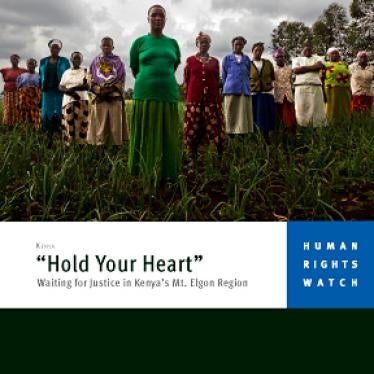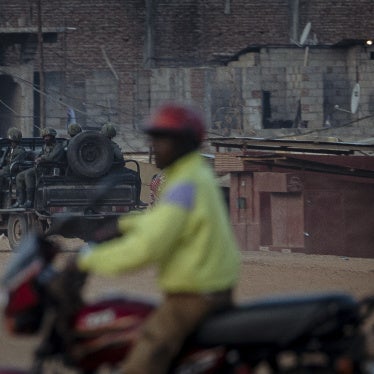(Nairobi) – Over 300 people are still missing three years after a conflict over an insurgency in the Mt. Elgon region, the majority of them forcibly disappeared by the Kenyan army, Human Rights Watch said in a report released today. The Kenyan government should immediately establish an independent inquiry to exhume suspected mass graves and to investigate atrocities committed by both Kenyan security forces and the militia known as the Sabaot Land Defense Force (SLDF). The International Criminal Court (ICC) should broaden its investigation in Kenya if the Kenyan government is unable or unwilling to carry out these investigations.
The 48-page report, “‘Hold Your Heart’: Waiting for Justice in Kenya’s Mt. Elgon Region,” examines the attempts of families of those forcibly disappeared by the Kenyan army and the SLDF militia to seek truth and justice. In the last three years, the Kenyan government has done little to assist victims in their search, Human Rights Watch said, and has not ensured an independent, impartial inquiry into the abuses by either side.
“The plight of the victims’ families is one of the most enduring scars of the violence in Mt. Elgon,” said Daniel Bekele, Africa director at Human Rights Watch. “With no bodies to bury, no death certificates, and no official recognition of the loss of their family members, these families remain in a legal and psychological limbo.”
The report is based on field investigations and interviews conducted in Kenya’s Western Province. While many human rights abuses dating to the Mt. Elgon conflict remain unpunished, “Hold Your Heart” focuses on the specific problem of unresolved abductions by SLDF militia and enforced disappearances at the hands of the Kenyan security forces.
The primary responsibility to investigate crimes committed in Mt. Elgon lies with the Kenyan authorities. As this report demonstrates, there has been an absence of credible investigations during the last three years for atrocities committed in Mt. Elgon, Human Rights Watch said.
The low-intensity Mt. Elgon insurgency started in 2006 when the SLDF militia resisted government attempts to evict squatters. The militia attacked thousands of civilians suspected of supporting the government – raping, killing, and mutilating them. In the run-up to the December 2007 elections, the SLDF waged a campaign of terror in favor of opposition Orange Democratic Movement (ODM) candidates for local council and parliament.
In response, in March 2008 the Kenyan government initiated a heavy-handed military and police joint operation known as Okoa Maisha (“Save Lives” in Swahili). Security forces carried out hundreds of extrajudicial killings and tortured and arbitrarily detained thousands of people. Between 2006 and mid-2008 the SLDF killed an estimated 750 people and the security forces an estimated 270. In addition, over 300 were disappeared – an estimated 199 at the hands of the security forces and 126 at the hands of the SLDF.
One woman described what the soldiers told her as they took her husband away: “Have you heard those bullets at Kimaswa? That’s the weapon that is going to be used on your husband.”
The atrocities in Mt. Elgon ceased in mid-2008 after national and international human rights organizations drew attention to the insurgency and the army’s brutality in addressing it. The army and police at the time claimed to be conducting internal investigations into the conduct of units operating at Mt. Elgon, but ultimately dismissed the allegations of abuse, and no members of the security forces were ever held accountable.
Similarly, despite the large number of killings attributed to the militia and the fact that over 3,000 men and boys were rounded up and detained on suspicion of being members or supporters of the SLDF, only four have been convicted of manslaughter, with others convicted of minor charges such as belonging to an outlawed group. Hundreds of killings, forced disappearances, and cases of rape and torture committed by the SLDF in Mt. Elgon in the service of politicians have gone unpunished.
In the absence of credible national investigations, Human Rights Watch recommends that the ICC prosecutor analyze whether crimes falling within the ICC’s jurisdiction were committed in Mt. Elgon and consider opening additional investigations in the Kenya situation to bring to account the people most responsible. The ICC is already investigating the violence in Kenya following the 2007 presidential election.
“It is imperative that the Kenyan government fulfill its obligation to protect the rights of all its citizens,” Bekele said. “If the government cannot ensure justice for the Mt. Elgon victims whose families have waited for over three years for justice, regional and international bodies should step in.”
The government has also made little effort to identify and exhume mass graves and allow for a dignified burial for victims, Human Rights Watch said. Some graves were exhumed during the military operation in 2008, but residents say that many remain. When local nongovernmental organizations tried to investigate the mass graves, they were threatened by soldiers.
Government officials have also blocked the families of the disappeared from accessing compensation that would come with official recognition of their relatives’ deaths. Widows’ organizations and victims’ family members told Human Rights Watch they were unable to access death certificates for their missing family members, and thus unable to receive compensation or benefits due to them under Kenyan law, including land titles, property, and access to bank accounts.
Lawyers and human rights organizations are assisting victims by filing cases at the Bungoma High Court and the East African Court of Justice, and taking complaints to the African Commission on Human and Peoples’ Rights. Others have filed a complaint before the United Nations Working Group on Enforced or Involuntary Disappearances.
“The Kenyan government should acknowledge the scope of the disappearances and act decisively to exhume mass graves and identify victims,” Bekele said. “The state’s failure to undertake these proceedings has not only deprived victims’ families of truth and justice, but has also prevented them from needed material assistance.”
Selected Testimony from “Hold Your Heart”:
Faith V.’s husband was arrested by soldiers at their home on March 16, 2008:
They started torturing him just next to our house. They were soldiers from Chepkube. When I witnessed him being beaten, I locked the children in the house so they wouldn’t see that. I couldn’t stand it.… I decided to run away [into the house] and not see it.
When I started crying and the children started crying, the military brought [my husband] back and he showed them his ID. They told me “We have brought him back for you to see him for the last time. Have you heard those bullets at Kimaswa? That’s the weapon that is going to be used on your husband.” The soldiers suspected my husband because he was from Chepyuk [an area from which residents had been displaced due to the disputed government land resettlement scheme opposed by the SLDF].
Elsa Chesut’s husband disappeared after being rounded up by the military:
On the 20th, after seeing that my husband was not returning, I went to [the military camp] to find out. But at the gate, a soldier told me “We don’t look for husbands in the camp. We look for them in the forest. Go and look for your husband in the forest.” He said this because the mortuary was in the forest. It was where the bodies were being dumped. But at the time I didn’t think like that. I didn’t believe he was dead.
Jane A. told Human Rights Watch that after her son was kidnapped by the SLDF:
I have never gone to the government to file a complaint. I didn’t know how to go to the government to report, and I couldn’t distinguish between the thugs and the police.
According to one woman whose husband was abducted:
I didn’t go to the chief or the police because if I had gone, I would have been killed. I was afraid that if I reported it, my life would be in danger. I still haven’t reported it. I still feel that way. Those guys are still in the forest. Some of them have been acquitted by courts and they’re just there. Mentioning now their names, you can be finished.
Ursula C., whose husband was also disappeared by the army, leaving her with nine children, told Human Rights Watch:
I’m really having problems taking care of these kids. There were two kids in secondary school and I was unable to pay school fees. They [school officials] never gave me any bursary. They said, “Go and bring the death certificate of your husband.” The chief told me, when I went to seek the death certificate, “You have not buried your husband. Do you want me to be in prison? What evidence do you have that your husband passed away? How do you know he died? He might have just gone to Uganda or other places.” So he chased me away. So I sold the cow that was left to pay the school fees.







